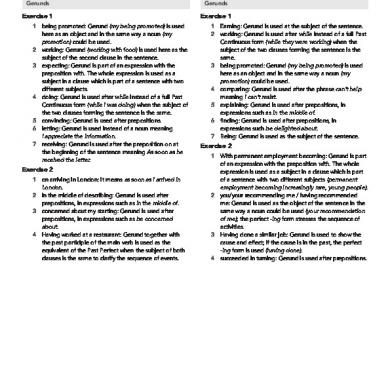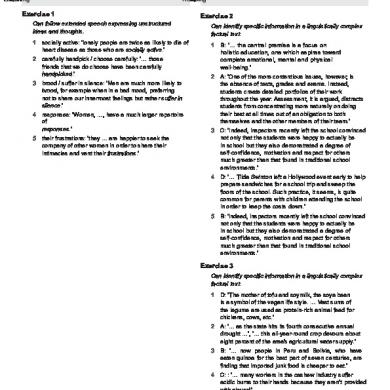Group A Group B: Speculating Speculating
This document was uploaded by user and they confirmed that they have the permission to share it. If you are author or own the copyright of this book, please report to us by using this DMCA report form. Report DMCA
Overview
Download & View Group A Group B: Speculating Speculating as PDF for free.
More details
- Words: 694
- Pages: 1
Loading documents preview...
GRAMMAR QUIZ 2 • ANSWER KEY
Group A Speculating
Exercise 1 1 A: must have felt – Deduction about a past situation (near certainty) supported by the second sentence (you looked so pale). 2 A: can’t have completed – Deduction about a past activity (near certainty) supported by the second sentence (there hasn't been enough time). 3 B: must have been created – Deduction about a past passive activity (near certainty) supported by the first sentence (the art studio … is very old). 4 A: may be trying to revise – Speculation about an activity in progress at the moment of speaking (possibility) supported by the second sentence (that's why he's not answering the phone). 5 B: may not realise it – Speculation about a present activity (possibility). 6 A: will probably join: Prediction for the future strengthened by the use of the adverb probably, which is placed between the auxiliary verb will and the main verb. 7 C: may sound – Speculation about a present activity (possibility); the verb sound is a state verb in this context and doesn’t have a continuous form.
Exercise 2 1 must have practised / must have been practising for: Deduction about the past (near certainty); a long time suggests an activity that started in the past (before achieving this level of proficiency) and either continuation (must have been practising) or overall duration of the activity (must have practised). 2 may (not) have found: Speculation about the past (possibility); by now suggests completion of the activity (may have found). 3 must have been lent to: Deduction about the past (near certainty) supported by the question in the past preceding it; additionally, passive perfect infinitive is used (have been lent) as it/the equipment is the subject of the sentence. 4 can’t have learned: Deduction about a past activity (near certainty) supported by the question in the past following it (Did someone ...?).
© Pearson 2017 FOCUS 5 PHOTOCOPIABLE
Group B Speculating
Exercise 1 1 B: could have been – Speculation about a state in the past (possibility) supported by a reference to a past activity (she didn’t answer the question). 2 C: can’t have revised – Deduction about the past (near certainty) supported by the second part of the sentence (he failed the exam). 3 A: could be preparing – Speculation about an activity in progress at the moment of speaking (possibility) supported by the second part of the sentence (they are practising). 4 B: must have been written – Deduction about a past passive activity (near certainty) supported by the second part of the sentence (they were so hard); the word questions as the subject of the sentence requires the use of the passive. 5 B: may not have – Speculation about a present state (possibility) supported by the first part of the sentence (we don’t know enough). 6 A: definitely won’t teach – Promise not to do something in the future strengthened by the use of the adverb definitely; if the contracted form is used, the verb goes before the whole contracted form. 7 B: may look – Speculation about a present activity (possibility); the verb look is a state verb in this context and doesn’t have a continuous form.
Exercise 2 1 may have studied: Speculation about a past activity (possibility) resulting in and supported by present evidence (the new lecturer speaks several languages very well). 2 can’t have been doing this for: Deduction about the past activity (near certainty), continuing in the present supported by present evidence (he’s not exactly good at it) and the use of for a long time requiring the perfect form. 3 must have been established: Deduction about a past passive activity (near certainty) supported by the use of the past forms in the sentences that follow; the word school as the subject of the sentence requires the use of the passive. 4 must have taught her to / must have been teaching her to: Deduction about the past activity (near certainty) which started in the past (before achieving this level of proficiency) and stressing either its continuation (must have been teaching) or overall duration of the activity (must have taught).
Group A Speculating
Exercise 1 1 A: must have felt – Deduction about a past situation (near certainty) supported by the second sentence (you looked so pale). 2 A: can’t have completed – Deduction about a past activity (near certainty) supported by the second sentence (there hasn't been enough time). 3 B: must have been created – Deduction about a past passive activity (near certainty) supported by the first sentence (the art studio … is very old). 4 A: may be trying to revise – Speculation about an activity in progress at the moment of speaking (possibility) supported by the second sentence (that's why he's not answering the phone). 5 B: may not realise it – Speculation about a present activity (possibility). 6 A: will probably join: Prediction for the future strengthened by the use of the adverb probably, which is placed between the auxiliary verb will and the main verb. 7 C: may sound – Speculation about a present activity (possibility); the verb sound is a state verb in this context and doesn’t have a continuous form.
Exercise 2 1 must have practised / must have been practising for: Deduction about the past (near certainty); a long time suggests an activity that started in the past (before achieving this level of proficiency) and either continuation (must have been practising) or overall duration of the activity (must have practised). 2 may (not) have found: Speculation about the past (possibility); by now suggests completion of the activity (may have found). 3 must have been lent to: Deduction about the past (near certainty) supported by the question in the past preceding it; additionally, passive perfect infinitive is used (have been lent) as it/the equipment is the subject of the sentence. 4 can’t have learned: Deduction about a past activity (near certainty) supported by the question in the past following it (Did someone ...?).
© Pearson 2017 FOCUS 5 PHOTOCOPIABLE
Group B Speculating
Exercise 1 1 B: could have been – Speculation about a state in the past (possibility) supported by a reference to a past activity (she didn’t answer the question). 2 C: can’t have revised – Deduction about the past (near certainty) supported by the second part of the sentence (he failed the exam). 3 A: could be preparing – Speculation about an activity in progress at the moment of speaking (possibility) supported by the second part of the sentence (they are practising). 4 B: must have been written – Deduction about a past passive activity (near certainty) supported by the second part of the sentence (they were so hard); the word questions as the subject of the sentence requires the use of the passive. 5 B: may not have – Speculation about a present state (possibility) supported by the first part of the sentence (we don’t know enough). 6 A: definitely won’t teach – Promise not to do something in the future strengthened by the use of the adverb definitely; if the contracted form is used, the verb goes before the whole contracted form. 7 B: may look – Speculation about a present activity (possibility); the verb look is a state verb in this context and doesn’t have a continuous form.
Exercise 2 1 may have studied: Speculation about a past activity (possibility) resulting in and supported by present evidence (the new lecturer speaks several languages very well). 2 can’t have been doing this for: Deduction about the past activity (near certainty), continuing in the present supported by present evidence (he’s not exactly good at it) and the use of for a long time requiring the perfect form. 3 must have been established: Deduction about a past passive activity (near certainty) supported by the use of the past forms in the sentences that follow; the word school as the subject of the sentence requires the use of the passive. 4 must have taught her to / must have been teaching her to: Deduction about the past activity (near certainty) which started in the past (before achieving this level of proficiency) and stressing either its continuation (must have been teaching) or overall duration of the activity (must have taught).
Related Documents

Group A Group B: Speculating Speculating
February 2021 1
Group A Group B: Gerunds Gerunds
February 2021 1
Group Activity
January 2021 2
Group Study
February 2021 1
Group Dynamics
January 2021 1
2018-02-19_isms_27001_fnd_en_sample_set01_v2, Group A
January 2021 0More Documents from "alberto89mejia"

Exercise 1 Exercise 2: Listening Reading
February 2021 1
Name: Class:: By Hardly Little Only Sooner Under Until
February 2021 1
Test Type Quantity Total Marks Timing
February 2021 0
Exercise 1 Exercise 2
February 2021 1
Listening, Use Of English And Reading: 1 A B C 2 A B C
February 2021 1